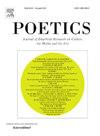Making the collectivist organization: Creativity, conformity, and social closure
IF 2
2区 社会学
0 LITERATURE
引用次数: 0
Abstract
Drawing from ethnographic fieldwork, in-depth interviews, and surveys, this study of a makerspace investigates social closure—processes by which groups maintain exclusive control over resources and opportunities—in an organization rejecting hierarchy and cultural conformity. This question is pertinent to organizations promoting collectivist and pluralist ideals. I found that despite espousing creativity and non-conformity, a culturally homogeneous in-group emerged in the organization. This highlights a tension between artistic and social critiques of capitalism, which are often espoused by collectivist organizations. The artistic critique challenges capitalism's instrumentalization of creativity, advocating for meaning and beauty in production. In contrast, the social critique targets inequalities and promotes inclusivity and justice. Members of the organization pursued the artistic critique through creative making but repressed a social critique. The organization's narrow focus on artistic critique led to a form of asceticism, limiting broader social impact. To counteract social closure and uphold collectivist ideals, organizations must actively prevent exclusive in-groups. Addressing economic disparities via alternative funding models and fostering mutual aid can mitigate unintentional hierarchies. Integrating artistic and social goals holistically by expanding the definition of creativity to include instrumental practices can bridge community divides.
集体主义组织的形成:创造性、从众性与社会封闭性
通过人种学田野调查、深度访谈和调查,本研究对创客空间进行了研究,在一个拒绝等级制度和文化一致性的组织中,群体保持对资源和机会的排他性控制的社会封闭过程。这个问题与促进集体主义和多元主义理想的组织有关。我发现,尽管支持创新和不墨守成规,一个文化上同质的内部团体在组织中出现了。这凸显了对资本主义的艺术批评和社会批评之间的紧张关系,集体主义组织往往支持这一点。艺术批判挑战资本主义对创造力的工具化,倡导生产中的意义和美。相反,社会批判针对不平等,促进包容和正义。该组织成员通过创造性的制作追求艺术批判,但压制社会批判。该组织对艺术批评的狭隘关注导致了一种禁欲主义,限制了更广泛的社会影响。为了抵制社会封闭和维护集体主义理想,组织必须积极防止排外的内部团体。通过替代融资模式和促进互助来解决经济差距问题,可以减轻无意的等级制度。通过将创造力的定义扩展到包括乐器实践,将艺术和社会目标整体地结合起来,可以弥合社区分歧。
本文章由计算机程序翻译,如有差异,请以英文原文为准。
求助全文
约1分钟内获得全文
求助全文
来源期刊

Poetics
Multiple-
CiteScore
4.00
自引率
16.00%
发文量
77
期刊介绍:
Poetics is an interdisciplinary journal of theoretical and empirical research on culture, the media and the arts. Particularly welcome are papers that make an original contribution to the major disciplines - sociology, psychology, media and communication studies, and economics - within which promising lines of research on culture, media and the arts have been developed.
 求助内容:
求助内容: 应助结果提醒方式:
应助结果提醒方式:


